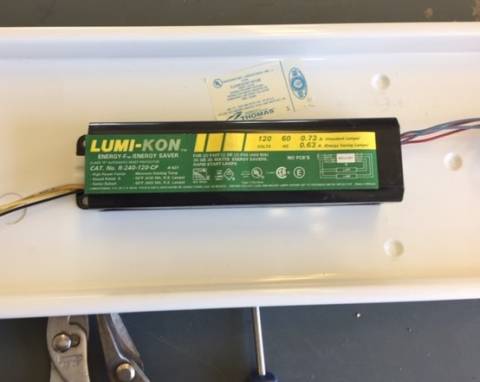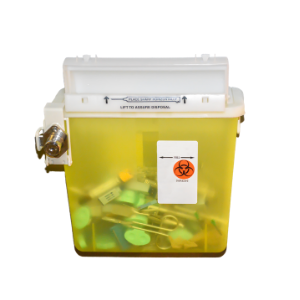Household Hazardous Waste
Household Hazardous Waste is closed to the public every Wednesday. Open for business waste by appointment only.
Monday, Tuesday, Thursday, Friday and Saturday 8:00 am - 4:30 pm
Closed to the public Wednesday
Free for Larimer County residents:
Typical household hazardous waste is accepted from Larimer County Residents for free. All other waste, including waste from businesses, churches, landlords, local governments, non-profits, and other organizations is subject to approval through the business program.
We accept:
- Paint
- Lawn Chemicals
- Automotive Fluids
- Batteries
- Cleaners
- And more -- check out the Accepted Items list below.
Know before you go:
- The limit is 30 gallons per visit, measured by the size of the container (not how full it is), or about 4 medium-sized moving boxes.
- Containers larger than 5 gallon capacity will not be accepted.
- We will take up to 10 fluorescent bulbs per visit.
- Bring your household chemicals in non-leaking, labeled containers. Keep chemicals in their original containers when possible.
- Please package waste upright in boxes to prevent spilling and mixing. Don't use trash bags or throw things in trash cans.
- Remove trash like incandescent light bulbs, empty and dry paint cans, and soiled paint brushes from your load.
- From out of county? We can only accept waste from Larimer County Residents. Find your county's HHW:
The HHW staff and manager reserve the right to refuse waste that is unacceptable, unsafe, or not a typical residential waste. If you have commercial waste, or other waste that's not from your personal use, please see the business waste section.
Drop N' Swap
To find out more about picking up paint and other items from the Drop N' Swap for free, check out the shopping information page.
Household hazardous waste (HHW) is any substance containing ingredients that could negatively affect your safety, health or the environment. Many products may be hazardous, including furniture polish, bleach, antifreeze, insecticides, paint, mothballs and much more.
How to identify Hazardous Waste:
Look for signal words on product packaging, including:
- poison,
- danger,
- warning and
- caution.
You can also look for indications of hazardous properties on the label. The Environmental Hazards Management Institute defines the following hazardous properties;
- Toxic: can cause injury or death if swallowed, absorbed or inhaled
- Flammable: easily catches fire and tends to burn rapidly
- Corrosive: a chemical or its vapors that can cause a material or living tissue to be destroyed
- Irritant: causes soreness or swelling of the skin, eyes, mucous membranes or respiratory system
- Explosive: violently bursting when exposed to pressure or heat
Dumping unused portions of household hazardous wastes in the trash or down the drain can cause safety and environmental problems. If buried in the landfill, chemicals can react and cause explosions or make their way into the groundwater. While the county strictly monitors the landfill's groundwater and gas emissions, and acts quickly to rectify any problems found, it is much easier to prevent such problems from occurring in the first place by properly disposing of or recycling hazardous wastes.
Properly disposing of hazardous waste through the hazardous waste program also helps protect our County's lakes, streams, and ponds.
So please act responsibly! Bring your unwanted HHW to the county's hazardous waste collection facility at the landfill. It's free for all Larimer County residents.
 Accepted
Accepted

- Aerosols
- Ammunition
- Antifreeze
- Ballasts (removed from fluorescent bulb fixtures)
- Batteries (small household and lead-acid auto batteries only; rechargeable batteries over 300 watt hours are not accepted)
- Brake Fluid
- Car Batteries (Lead Acid only)
- Car Care Products
- Cell Phones
- Compact Fluorescent Lamps (CFLs)
- Cleaners
- Cooking Oil
- Fertilizers
- Fire Extinguishers
- Fireworks
- Fluorescent light bulbs: up to 10 at a time, bundle them without tape (use rubber bands, twine, or wire ties instead) or bring them in boxes.
- Gasoline
- Glue and Adhesive
- Hobby Chemicals
- Mercury containing thermostats, thermometers
- Motor Oil
- Oil Filters
- Over the Counter Medication
- Paint
- Pesticides
- Pool Chemicals
- Propane Tanks/Butane Tanks (Grill size or camping size)
- Road Flares
- Sharps from personal use only (in FDA approved sharps containers ONLY)
- Stain
- Thinners and Solvents
 Not Accepted
Not Accepted

- Acetylene tanks
- Air Conditioners/Appliances with Freon (accepted into the resource recovery area of the landfill for a fee)
- E-bike and E-scooter Batteries
- Electric Vehicle Batteries
- Electronics: take them to Electronics Recycling
- Empty gas cans: remove lids from empty containers, leave outside overnight to vent and dispose of with trash
- Empty oil containers can be disposed of in the trash
- Empty paint cans can be put in the trash with lids removed
- Empty pesticide containers can be disposed of in the trash
- Fluorescent light fixtures
- Grout
- Incandescent and LED bulbs
- Lithium Car Batteries
- Lithium batteries more than 300 watt-hours, larger than 12" x 12" x 8," or lithium batteries that weigh more than 11 pounds
- Oxygen and compressed gas tanks other than propane and butane
- Paint Brushes are trash
- Prescription Medications
- Propane tanks larger than grill size
- Radioactive Waste
- Sharps from businesses or if not in an FDA approved sharps container
- Smoke Detectors
- Stucco
- Styrofoam
- Tires (accepted into the resource recovery area of the landfill for a fee)
- Waste from the following entities is not accepted through the residential program, but may be accepted through the business program:
- businesses,
- churches,
- landlords,
- local governments,
- non-profits,
- and other organizations.
Find more information on what to do with items we don't accept on our resource page.

Fluorescent Bulbs and Ballasts
Bulbs:
- We accept up to 10 florescent tubes per visit.
- Please bundle bulbs without tape (use twine, rubber bands, or wire ties) or bring them in boxes.
- Handle bulbs with care. They contain mercury vapor that is released when they break.
Ballast (Pictured):
- The ballast is inside of the fluorescent fixture and needs to be removed for proper disposal.
- Ballasts make fluorescent lamps start and regulate the flow of electricity through bulbs.
- Some ballasts contain hazardous substances, like PCBs or polychlorinated biphenyls. PCBs have been shown to cause cancer and other adverse health effects.
- Bring your ballasts to the HHW for recycling!
Fluorescent Fixtures:
- Remove the bulbs and ballast from the fixture.
- Recycle the rest of the fixture at a metal recycler. Find one on this list.
We will not accept the entire fixture, just the bulbs and ballasts. Please disassemble them before you come.

- Sharps are accepted from Larimer County Residents ONLY
- The limit is two containers of sharps per visit.
- Sharps must be in FDA approved sharps containers; we will not accept any other container type.
Contact Us
5887 S. Taft Hill Road
Fort Collins, CO 80526
Phone: (970) 498-5771 or (970) 498-5773
24-hour information line: (970) 498-5770
Drop Off Hours: Monday, Tuesday, Thursday, Friday and Saturday 8:00 a.m. - 4:30 p.m.
(Closed to the public Wednesday)


